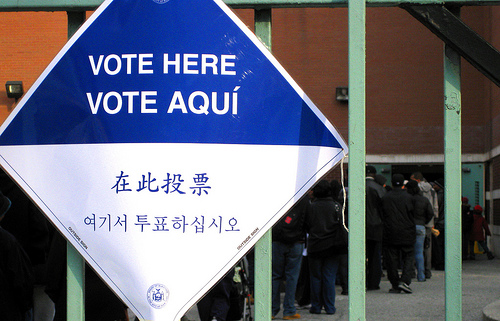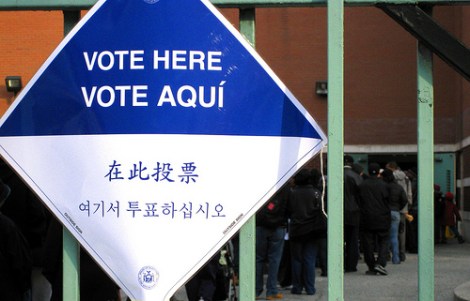From the Wall Street Journal:
The U.S. oil industry is for the first time making a direct political pitch to its employees and others, borrowing from traditional union tactics in a bid to secure a friendlier environment in Washington. …
Companies tend to shy away from such direct involvement in elections because they worry about a backlash from lawmakers and employees.
The industry’s campaign is focused on the roughly nine million Americans whose jobs are tied to the oil and natural-gas industry, from drillers to truck drivers to low-skilled workers who help build pipelines. The goal is to persuade a majority of Americans to support expanded oil drilling, hydraulic fracturing and pipeline construction, including the Keystone XL Pipeline.
“We realized that we are sitting on a vast resource of employees who can register their views,” said Jack Gerard, the president of the American Petroleum Institute, the industry’s Washington trade association and organizer of the effort.
“A vast resource of employees,” many of whom have mouths and can vote! Nice observation there, Jack.
As noted in the first paragraph, this isn’t new, really. For decades — well more than a century, really — employers have worked to impress their views about unions upon employees. Holding mandatory meetings and passing out literature about how much better the workplace would be without workers having a voice on the job are a long-standing scourge to the labor movement. And now, the oil industry suddenly realizes, the same idea can be applied to politics.
The difference-maker wasn’t a flash of inspiration Jack Gerard had one night after eating too many racks of lamb. Instead, as David Graham notes at the Atlantic, the difference is Citizens United. Citing the example of Robert Murray, CEO of Murray Energy, requiring PAC contributions from employees, Graham writes:
It’s likely that they would have been riskier for employers prior to the Citizens United decision. Back then, they could talk to managers. Now, they’re free to communicate directly with employees — though [AFL-CIO general counsel Laurence] Gold suggests they’d have to disclose the costs of such communication.
“Employers have mostly been gun-shy about doing this,” Gold says. “Employers ought to be very circumpsect about this, and people ought to look at what they’re doing with tremendous skepticism.”
Gold also suggested to Graham that the employers might not have as much leeway as they think.
Gold and others see a connection between rules in the National Labor Relations Act and political activism. Employers are barred from, for example, threatening to close a plant if employees unionize. By analogy, lawyers see a way in which threatening to close a plant if workers fail to elect the right candidate might also be barred, although it isn’t clear that courts would find the same.
According to the Journal, the oil industry’s campaign is more subtle.
Instead of relying solely on television ads and Washington lobbyists, the American Petroleum Institute and its allies are going door-to-door to persuade employees and others that promoting energy production will lead to more American jobs. As part of that effort, Mr. Spooner and the industry is building a network that can contact and talk to employees and others about energy issues, sometimes at their homes.
In a Columbus, Ohio, suburb recently, a few dozen residents gathered at the home of a local supporter for a party arranged by industry representatives. While sipping Miller Lite and munching on microwave pizza, those gathered listened as local speakers recruited by the industry spoke about the impact of high energy prices and the benefits to Ohio of more hydraulic fracturing.
Marty Durbin, an official with the American Petroleum Institute, told the group that the industry’s message was “not about which candidate to support or which candidate not to support.” He continued: “We think that if people understand the issues, we’re going to get good policy in Washington.”
This isn’t ExxonMobil telling its employees that a refinery will close its doors if they don’t vote Romney. It’s a few code words spoken while giving a wink and tapping a wallet. As Slate’s Matt Yglesias notes, it’s not like employees aren’t aware of how their employers would like them to vote. There’s little reason to think that what the industry is trying to do is coerce rather than convince.
It was nearly a century ago that author and activist Upton Sinclair provided the best summary of the strategy at play here, in a book documenting his failed gubernatorial run, I, Candidate for Governor: And How I Got Licked.
It is difficult to get a man to understand something, when his salary depends on his not understanding it.
It is hard to convince a man to vote against his employer.
Sinclair lost his gubernatorial race, incidentally, at the hands of Campaigns, Inc., the first American political consultancy, which rose to prominence building effective political campaigns in defense of massive corporate monopolies.
Monopolies like Standard Oil.




